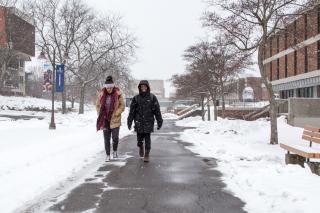Over the next 48 hours, the Ithaca region is expected to be impacted with a significant arctic blast which will plunge air and wind chill temperatures to the coldest we have experienced thus far during this winter season. The National Weather Service has issued a Wind Chill Advisory extending from 7:00 a.m. Friday, February 3, through noon on Saturday, February 4.
During this brief stretch, this arctic blast is expected to bring air temperatures around 0 degrees and wind chills as low as -20 degrees. The coldest wind chills are expected to impact our area Friday evening and the overnight hours into early Saturday morning. When temperatures reach these low levels it greatly elevates risk for significant health impacts including frostbite, hypothermia, as well as the potential for property damage due to freezing pipes.
I strongly encourage our campus community to please be mindful of the following as you contend with these low temperatures over the coming hours.
Frostbite and Hypothermia
At the temperatures we are forecasted to experience during this upcoming arctic blast, dangerous health impacts such as frostbite and hypothermia can set in only a matter of minutes.
Frostbite is the biggest risk for our community and typically impacts outer extremities of the body such as fingers, toes, the nose, the earlobes, and exposed areas of skin. Symptoms of frostbite include skin that is discolored, appears waxy, and is cold to the touch. Hypothermia can also occur with more extended exposure and can typically include symptoms such as: low body temperature, intense shivering, exhaustion, confusion, loss of motor function, memory loss, slurred speech, and drowsiness.
I strongly encourage our IC community to dress appropriately to minimize exposure to cold temperatures while outside. Dressing in layers, utilizing hats, gloves, scarves and thick socks to protect outer extremities, and limiting time outside are the best ways to protect against these health impacts.
Residential Reminders
In addition to the health impacts listed above, extreme cold temperatures also elevate the risk for property damage due to frozen pipes and other infrastructure issues.
To maintain consistent heat and minimize risk for these issues, please remember to keep your windows closed and maintain a steady flow of temperature-controlled air at all times. The Office of Residential Life requests that all students living in on-campus residential halls who are able to control their own heat keep their thermostat set at a minimum temperature of 70 degrees.
Students experiencing any heating issues should contact the Office of Public Safety at (607) 274-3333 to receive immediate assistance.
Looking Ahead
Forecasters expect this stretch of extreme cold temperatures to subside during the second half of the upcoming weekend with above average seasonal temperatures returning on Sunday.
It also should be noted that the college does not anticipate any impacts to its operational status at this time.
Thank you for your cooperation and commitment to a safer campus community.
Sincerely,
Samm Swarts
Assistant Director, Emergency Preparedness and Response
Office of Public Safety and Emergency Management

